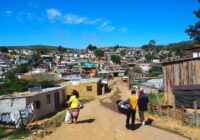Despite many countries in Asia and Africa being underdeveloped, South-South cooperation is still important.
Indonesia plays a central role in Asian-African relations. In 1955, the country hosted the Bandung Conference, where President Sukarno took special pride in addressing the representatives of 25 nations—the majority of which had only recently achieved sovereignty—portraying himself as the leader of the group he termed “Newly Emerging Forces” (NEFOS). The aim was to counter Western imperialism and colonialism.
In 1992, almost four decades later, then-Indonesian President Suharto addressed a grown body of states at the 10th summit of the Non-Alignment Movement (NAM) in Jakarta, seeing a further need for “Third World” countries to represent their interests collectively.
On April 24, exactly 60 years after the first large-scale Asian-African summit, incumbent Indonesian President Joko Widodo reiterated in his speech at the Asian-African Conference 2015 the relevance of South-South cooperation. He accused industrialized nations of actively hampering the development of poorer countries.
Soon after the 2015 summit, critics voiced their concern that after six decades of Asian-African cooperation, nothing had changed and that it would not be enough to only criticize others for the shortcomings of the Global South. Sarcastic voices even called the conference a waste of money and resources.
Documents adopted by Asian-African Conferences could be made more thorough, and while most of the “Newly Emerging Forces” are still considered to be developing countries, the global political context has changed fundamentally. With the breakup of the Soviet Union and the end of the Cold War, capitalism in its various forms has won, but it has struggled to sustain a sense of victory since the early 1990s. This begs the question: Has any progress come out of the Global South after six decades of cooperation?
In this year’s official conference report, the Bandung Message 2015, member states of the New Asian-African Strategic Partnership (NAASP) declared that “Asian-African intra-regional trade and investment has yet to reach its full potential,” as Asia, itself an expanding market, only accounts for 26% of trade flow in Africa. Thus, although NAASP countries make up 30% of global gross domestic product (GDP) and about 75% of the world’s population, there is still huge room for improvement.
Since 2004, Indonesia has been considered to be part of the G20, but it is notable that together with India and South Africa, the country is only one of three constant members of the Group of 20 major economies that come from Southeast Asia, Africa or South Asia.
When evaluating economic development in Asia and Africa, it is necessary to consider the post-colonial dispositions many countries in the two continents still have to cope with. Since 1955, industrialized nations cannot solely be blamed for both continents’ continued troubles in reaching their estimated potentials.
In a report published in 2000, the World Bank assessed the necessary conditions for Africa “to claim the 21st century.” The report saw major changes in four areas: improving government and resolving conflict; investing in people; diversifying the economies; and reducing aid dependency by strengthening partnerships. Ten years later, most experts agreed that not much had been achieved in these areas. While some countries have managed to show reasonable economic success relative to when they became sovereign, most have gone up and down in development. Major reasons can be found in the ineffectiveness of political and economic institutions in providing incentives.
For Asia, observers deliver the same diagnosis. Although different in details, the major challenges are similar: countering climate change; closing the gap to many Western nations while staying sovereign from outside influence, which means solving conflict; lessening aid dependency; and implementing culturally sensitive good governance and diversifying economies.
As for support from the international community, the United Nations spearheads attempts to find solutions to the problems with various initiatives engaging in direct cooperation with the two continents. Apart from the United Nations Development Program (UNDP) that operates globally, the Economic and Social Commission for Asia and the Pacific (ESCAP) and the Asian Development Bank are supposed to act as primary international facilitators in Asia, while in Africa, the Economic Commission for Africa (ECA) and the African Development Bank are responsible. So far, however, while successful in specific cases, overall efficiency of these institutions is highly debated.
Global South Importance
Considering all of this, it is clear that Asian-African summits are not a waste of time or resources. Granted, most countries attending the 2015 conference in Indonesia have not yet shed their status of a developing nation, and indeed, Asian-African cooperation could be more precise and productive. Nonetheless, as Indonesian President Suharto said in 1992 when observers were wondering whether after the Cold War there was still a need for a movement of non-aligned states, the definition of non-alignment “should not be restricted solely to referring to non-alignment with two blocs or two political powers,” as “the essence of non-alignment is much broader, much deeper.”
Keeping to consultations should, therefore, allow the nations of the “Global South” to bring their resources together and speak with one voice. It is in this light that the repeating statements of the key note speakers throughout the years need to be seen. General issues like difficult market conditions imposed on developing nations by industrialized countries—or more specifically, the conflict surrounding the Palestinians—are recurring topics in South-South cooperation and have not been solved. These issues cannot be handled without cooperation between the Global South and industrialized nations.
Although many countries in both Asia and Africa are still dangerously underdeveloped, it is important to acknowledge that South-South cooperation has counted for something if one looks at how far the countries have come since being granted independence.
All in all, a refreshed approach is needed to put the Global South’s archaic sole focus on national interests to rest. Mutual understanding and open cooperation will hopefully bear more fruit in the decades to come for the majority of countries and people involved in the ever relevant process of South-South cooperation.
The views expressed in this article are the author’s own and do not necessarily reflect Fair Observer’s editorial policy.
Photo Credit: Vladimir Wrangel / Shutterstock.com
 We bring you perspectives from around the world. Help us to inform and educate. Your donation is tax-deductible. Join over 400 people to become a donor or you could choose to be a sponsor.
We bring you perspectives from around the world. Help us to inform and educate. Your donation is tax-deductible. Join over 400 people to become a donor or you could choose to be a sponsor.
Support Fair Observer
We rely on your support for our independence, diversity and quality.
For more than 10 years, Fair Observer has been free, fair and independent. No billionaire owns us, no advertisers control us. We are a reader-supported nonprofit. Unlike many other publications, we keep our content free for readers regardless of where they live or whether they can afford to pay. We have no paywalls and no ads.
In the post-truth era of fake news, echo chambers and filter bubbles, we publish a plurality of perspectives from around the world. Anyone can publish with us, but everyone goes through a rigorous editorial process. So, you get fact-checked, well-reasoned content instead of noise.
We publish 2,500+ voices from 90+ countries. We also conduct education and training programs
on subjects ranging from digital media and journalism to writing and critical thinking. This
doesn’t come cheap. Servers, editors, trainers and web developers cost
money.
Please consider supporting us on a regular basis as a recurring donor or a
sustaining member.
Will you support FO’s journalism?
We rely on your support for our independence, diversity and quality.







Comment